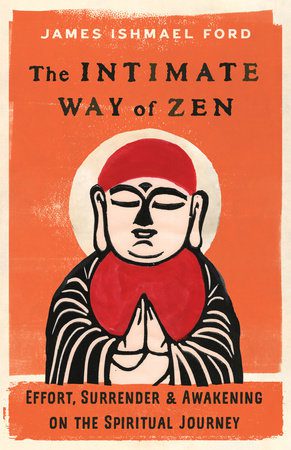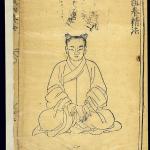
James Ishmael Ford
Cover by Seigaku Amato
“A non-Buddhist visited the great sage and said, “I don’t ask about the way of words, I don’t as about avoiding words. The Buddha sat quietly. Witnessing this, the non-Buddhist exhulted, “No wonder you’re the world honored one. Out of your compassion and mercy, you have parted the clouds of my delusions and opened the way for me to walk through.” He made bows of gratitude and departed. Later the Buddha’s attendant Ananda asked, “What did the non-Buddhist realize that made him praise you?” The Buddha responded, “She is like a fine horse, who can run at even the shadow of a whip.”
Gateless Gate[1]
I’m very fond of and curious about the rising group of people who self-designate as spiritual but not religious. My fondness is not without criticisms. As a religious professional, I served as a Unitarian parish minister for a quarter of a century, I’m something of a minority in this appreciation. The whole idea does have problems, starting with the fact for all practical purposes spirituality and religion are usually used interchangeably. And too often people who say they’re spiritual but not religious really mean they’re interested in the fun bits. But if something like, say discipline is involved, count them out.
I have been known to joke I’m religious but not spiritual. In fact, that phrase spiritual but not religious speaks to something very important. Possibly even the heart of a way into the deepest matters perfect for our faithless and dangerous time.
The word religion is itself a construct of relatively recent Western thinkers and scholars. That doesn’t mean it lacks usefulness. In fact, the whole point of the word is its usefulness. Investigating what religion might mean has led people on a quest to unravel those parts of a culture concerned with meaning and purpose.
And in this digging around things have been uncovered that before were obscured. The broadest use of that word religion, as I’ve said several times here, is to describe the various means of cultural reinforcement. This sense of religion tells us where we came from and where we’re going. It tells us who the family is, and who is not part of the family. Or some idea of family. That’s the work of religion most of the time. And when it is not used to club people who don’t belong, it is more than worthy. We are born out of our cultures, our cultures give us language, and tell us much about what we are.
But there’s more. There’s also religion as the songs of the ancestors about hurt and loss, about healing and finding. Often it is about that elusive dream of slumber and waking. It’s related to the cultural thing, but it runs even deeper.
Here we find amazing things. The method sounds easy. When we loosen the chains of literalisms, but still take the matter seriously, we can discover amazing things within the collected teachings of any of the world’s religions. Not easy this not literalizing. But a rich project. Letting go of the religion that is all about right and wrong, while taking it all seriously. Doing this we can find what the ancestors wanted to share with us that really matters.
Taking it all as seriously as a heart attack. What does that look like?
Some years ago, I served on the membership committee of the American Zen Teachers Association. It had been formed largely out of a list of names compiled by some of that second generation of Zen teachers including luminaries like Bernie Glassman and Mel Weitsman. But as it grew, we found it important to explore whether a potential candidate fit the definition of “peer.” As a peer support group that was very important.
Anyway, we also found it important to try and clean up that original membership list. And so it came to pass that one of our Zen teachers was assigned to check in with a Roman Catholic nun, Sister Elaine MacInnes. Actually, she’s one of the more legendary figures on the Zen scene. While she lived much of her life in Japan and the Philippines, she was a Canadian, and in her retirement was back home in Toronto. The interviewer is one of the more respected among our contemporary Zen teachers. Many would use the word Zen master to describe him. He went to visit. And when he reported back, he said she turned the meeting into a Zen encounter and, well, she won.
So. A Christian Zen master. But also, most Zen masters train in Buddhist monasteries. Some live in them for the whole of their lives. Others become priests in charge of Buddhist temples. Ruth Fuller Sazaki, probably the first Westerner to be ordained a Rinzai Zen priest, co-author of the magisterial study of the Zen koan, Zen Dust, wrote a widely read pamphlet, ‘Zen: A Religion.”
While on the other hand the SanboZen roshi, Koun Yamada would emphatically and on more than one occasion insist “Zen is not a religion.” He never phrased it like this, but he very much was pointing to the spiritual within religions.
Part of the problem is semantic. It’s how one defines that word “religion.” Zen turns out to work for people of no particular faith. It works for humanists, It works for agnostics and atheists. It works for Jews, and Christians, and Muslims, etc. Etc. So. Sensei Sasaki is right. Zen is a religion in several senses. So. Roshi Yamada is right. Zen has nothing to do with religions in any of its senses.
In that story of the encounter between the Buddha and a non-Buddhist, after that little love feast of nondual exchange, his disciple Ananda asked the Buddha what did the non-Buddhist understand? Ananda is always the straight man in these stories.
The World Honored one replied, in one version, “that non-Buddhist is like a great racehorse, who dashes at even the shadow of the whip.” So, if anyone can attain to the way, what would you say the answer to the question “is Zen a religion” might be?
Yes? No?
We might say Zen can be the spiritual within religions. Certainly, Zen offers the way to find that spiritual which shows us meaning in a meaningless world.
***
Here’s an earlier reflection using the same title. Two views at no extra charge…
[1] Gateless Gate, case 32, author’s version














